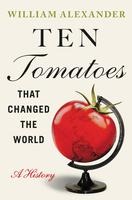"The tomato gets no respect. Never has. Lost in the dustbin of history for centuries, accused of being vile and poisonous, subjected to being picked hard-green and gassed, even used as a projectile, the poor tomato has become the avatar for our disaffection with industrial foods - while becoming the most popular vegetable in America (and, in fact, the world). Each summer, tomato festivals crop up across the country; the Heinz ketchup bottle, instantly recognizable, has earned a spot in the Smithsonian; and now the tomato is redefining the very nature of farming, moving from fields into climate-controlled mega-greenhouses. Supported by meticulous research and told in a lively, accessible voice, Ten Tomatoes That Changed the World seamlessly weaves travel, history, humor, and a little adventure (and misadventure) to follow the tomato's trail through history. A fascinating story complete with heroes, con artists, conquistadors, and-no surprise-the Mafia, this book is a mouth-watering, informative, and entertaining guide to the food that has captured our hearts for generations"--]cProvided by publisher.


